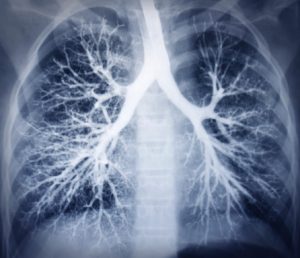
Lupus is an autoimmune disease that often impacts the lungs, and research shows pulmonary complications with this disease can lead to pleuritis, pneumonitis and pulmonary hypertension.
Advertisement
When a person has a lung infection it usually affects their airway and lung tissue, but with lupus it seems that it can impact all compartments of the lungs and include pleuritis, which is inflammation of the linings around the lung, as well as pulmonary hypertension (high blood pressure that occurs in the arteries in the lungs). Those with lupus and lung problems can also get pneumonitis, inflammation of the walls of the alveoli in the lungs, normally caused by a virus.
Lung problems that occur in lupus
 Lupus and lung involvement are not automatic. In other words, just because you have lupus does not mean that you will have lung problems. Studies suggest that about 50 percent of those with lupus with eventually suffer from some sort of lung disease. Medical researchers think it is important that patients fully understand the complications that could arise so they can be addressed at the first signs – before symptoms get too out of control.
Lupus and lung involvement are not automatic. In other words, just because you have lupus does not mean that you will have lung problems. Studies suggest that about 50 percent of those with lupus with eventually suffer from some sort of lung disease. Medical researchers think it is important that patients fully understand the complications that could arise so they can be addressed at the first signs – before symptoms get too out of control.
So just how does lupus affect the lungs? Chest pain, cough and shortness of breath are the most common symptoms associated with lupus and lung problems. However, lupus lung pain can be uncomfortable and severe. It could be a sign of a more serious lung issue, such as pleuritis or pneumonitis.
- Pleuritis chest pain: this pain takes place in the chest wall and can be diagnosed by a family doctor. The inflammation from pleuritis is normally in the cartilage that connects the rib to the sternum. Although this type of inflammation can occur in people without lupus, it is much more common in those who have the autoimmune disease.
- Pneumonitis: in many cases, this is caused by inflammation or a bacterial infection. This is a problem for those with lupus because medications used to treat the disease in fact increase the risk of bacterial infection. Additionally, lupus sufferers can develop inflammation in their lungs that is associated with the disease.
- Pulmonary hypertension: if there is any scarring due to disease of the lung, more pressure is needed for the heart to push blood from the right ventricle into the lung. Another way for blood pressure to be impacted is when the disease affects the capillaries in the lung. This can decrease blood flow.
- Other lung problems: shrinking lung syndrome, a condition that literally leads to smaller lungs; pulmonary hemorrhage, which is bleeding in the lung, and interstitial lung disease, a chronic inflammation/scarring of the lung tissue are all associated with lupus.
As you can see, lupus effects on lungs can be widespread. Some of the complications associated with lupus will be familiar to those who know little about this autoimmune disorder. For example, upper respiratory tract infections are common among the general population, but did you know that lupus patients are more likely to experience them?
Diagnosis of lung problems in lupus patients
 Lupus and lung symptoms should not be ignored. At the first sign of discomfort, a lupus sufferer should see a doctor. Diagnosis of lung problems is not that difficult in most situations.
Lupus and lung symptoms should not be ignored. At the first sign of discomfort, a lupus sufferer should see a doctor. Diagnosis of lung problems is not that difficult in most situations.
Chest x-rays are usually the first step if a person is showing signs of lupus lung pain. If no problems are detected then a chest CT scan will likely be ordered. Chest CT’s with intravenous contrasts are often used in people with lupus if they have chest pain and are short of breath. The scan can detect blood clots that have traveled to the lung. As well, a high-resolution chest CT can detect interstitial lung disease.
Pulmonary function tests are used on many patients complaining about lung problems, including lupus sufferers. The most basic test is conducted with what is referred to as a “Spirometry”. This tool measures how much the person is able to breathe in and out, as well as how fast they are able to breathe in and out. It’s simply a matter of exhaling into a mouthpiece connected to a machine. A lung diffusion capacity test is similar to this, but it measures certain gases, such as low concentration of carbon monoxide, which determines the amount of oxygen that passes into the blood from the lungs. The readings of carbon monoxide help doctors determine what surface area of the lung is damaged.
There is also a 6-minute walk test that can help doctors evaluate how well the lung saturates the blood with oxygen. This test is normally conducted when lupus effects on lungs include shortness of breath.
There are some diagnostic tests that are more invasive than the ones outlined above. For example, a bronchoscopy requires anesthetic for a pulmonologists to see into the airways of the lungs to collect samples to be tested. A thoracic surgeon may want to conduct a surgical biopsy to confirm pulmonary hypertension or a right heart catheterization test, which involves guiding a small catheter into the right side of the heart and artery going into the lung.
Steps to take when lupus affects your lungs
 Shortness of breath, coughing, wheezing, as well as pain in the chest or pain in the lungs – these are all signs of trouble in people who suffer from lupus. If you have lupus and breathing becomes really difficult, you should get to a hospital immediately.
Shortness of breath, coughing, wheezing, as well as pain in the chest or pain in the lungs – these are all signs of trouble in people who suffer from lupus. If you have lupus and breathing becomes really difficult, you should get to a hospital immediately.
Advertisement
Once you get to a doctor, the proper tests can be conducted to determine what is going on. Based on the results the doctor may instruct you to stay away from triggers of lupus and lung symptoms, such as smoking, second hand smoke, and exposure to pollutants.
Often times when we aren’t feeling well, we shy away from exercise; however, exercise is important for those who have lupus because it forces them to breathe deeply, which can help keep the lungs strong.
It is also important to note that certain foods can increase the level of inflammation in our bodies so taking a close look at diet can also impact lupus and the pain associated with the disease. If you are a lupus patient, talk to your doctor during your next visit about your risk of lung problems, including how to spot them.
